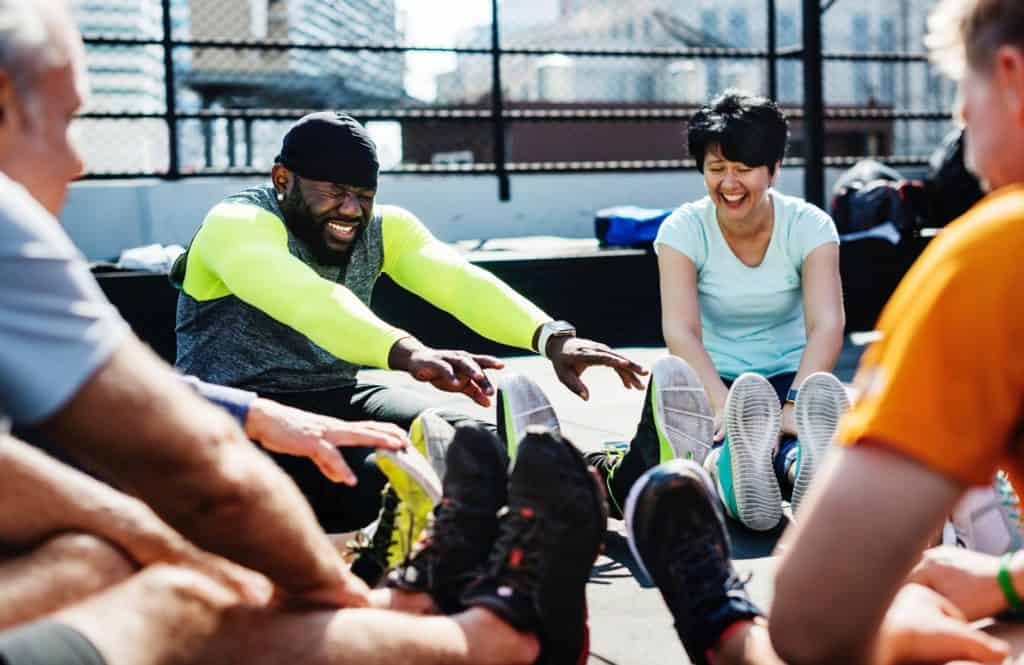Exercise Recovery Tips
Going to the gym is a process. It takes a while to see progress. There are days you want to quit, but once you start to see progress it is hard to stop. Visible results breed motivation. Motivation causes more development. It’s a cycle. Once you are in that cycle, your vision zeros in on the goal, and most people become unstoppable. We don’t always think about the best way to get to our goal, though, so we push towards it full steam ahead not thinking about a very important part of fitness: exercise recovery.
Rest periods are a requirement for proper growth. Period. Without them you risk injury, plateauing, poor workouts, and emotional or mental disturbances. Over training is real, ugly, and can happen to anyone, so we need a plan to avoid it as much as possible.
There have been tons of people who have made lots of progress in the gym, just to be derailed by not taking enough time to recover, and succumbing to demotivating injuries or focus.
We have pulled together 6 fantastic ideas to help you speed recovery, and set your body up for success:
1. Mandatory Rest Days
We take vacations to help us decompress from the stress of our day-to-day grind. Getting away from the same daily routine helps to keep us from feeling worn out; overwork and boredom set in otherwise.
Our bodies need the same thing when it comes to exercise. Going to the gym takes a lot of out of us, physically and mentally. Our muscles need some time off, and your body needs to recover and decompress after being put under heavy stress (exercise).
The extra burdens we put on our bodies in pursuit of whatever goals we have can start to take a toll on us if we aren’t careful. Soreness is an easy to read sign that our bodies are going through exercise recovery, but there are others as well. Fatigue, uncharacteristic moodiness, bad workouts, little to no progress, and just feeling like you should take it easy are all signs you should take it easy.
If you are still feeling sore after 72 hours, have an uncharacteristic feeling of overall sluggishness, or just can’t get a good workout in, you might need a rest day or two.
Off days don’t mean to necessarily sit around and do nothing, but keep it easy. Stick to active recovery techniques on your days off if you insist on doing anything, so you can ratchet down the pressure on your body.
Make sure that you add in a few days off of heavy activity each week so your body can start to recover.
2. Proper Nutrition
Nutrition is the number one driver of any fitness routine. Our bodies need more than just calories to rebuild, it also needs the vitamins and minerals found within different foods.
Make sure that you are eating properly to help your body recover after exercise. That means bringing in enough protein to help your muscles rebuild, without neglecting other nutritional requirements. Fats and carbohydrates each have their own unique functions, and are necessary for recovering after a heavy day, as are many different micronutrients.

- Fats help move certain vitamins through our bodies that cannot be dissolved otherwise, such as vitamin A, D, and K.
- Carbohydrates provide energy to do all the rebuilding.
- Vitamin A supports bone growth
- Vitamin E helps regulate inflation
- Omega 3’s help with soft tissue support
Don’t neglect different groups of nutrients because of bro science, eat a balanced diet.
Highly processed foods (candy, deserts, junk foods, etc.) are nutrient light foods that won’t help with recovery in most cases.
The old saying, “Junk in, Junk out” applies here. You can’t expect to show major results on a diet full of chips and soda. Feed your body properly and it will reward you with growth.
3. Get Enough Sleep
Sleep is when your body does its best work. Most exercise recovery happens when you are unconscious. Unfortunately, people today neglect sleep in many cases to pursue other, more ‘exciting’ things. Bar visits, late nights at work, and watching TV or scrolling aimlessly on social media are all things that take up time when we should be sleeping.
Our bodies need sleep, though, especially for those of us who are actively trying to better our physical appearance, strength, or health. Not getting enough sleep can have tons of negative consequences regardless of who are, such as:
- Trouble with remembering details
- Bad mood
- Weak immune system
- Harder to focus
Sleeping allows your body to divert valuable energy away from other functions (walking, talking, exercising, etc.) and towards tissues that need to be rebuilt.
Additionally, growth hormone is released during deep sleep, which helps us to put on muscle mass among other things.
If that weren’t enough, studies have shown that not getting enough sleep can actually cause us to lose muscle mass.
Quality sleep is a requirement for optimal progress. Aim for at LEAST 7 hours of sleep a night. That way, your body can rebuild itself.
4. Stretch
Very few things are better than a deep stretch when you first get up in the morning. Stretching does far more than feel good when you first wake up, however. Stretching helps speed up exercise recovery.

When you exercise, your muscles build up lactic acid. This acid is a byproduct of what your muscles have to do in order to move. Heavy breathing helps to swap out lactic acid for nutrients and fuel that your cells need, but it doesn’t get it all out, leaving a build up in each cell.
Going from a heavy stress situation, like exercise, to a sedentary (office) setting without stretching doesn’t wring the waste out of your muscles. It also doesn’t help to reduce the tension that your muscles encounter when they are used heavily. Stretching helps to remove lactic acid build up in the body and reduces any knots or tension that your muscles have, reducing overall soreness.
Statically stretching after exercise works to lengthen muscles and tendons, making them more limber and able to be pushed further next time. In turn, this helps your future recovery times by reducing the potential for injury and allowing your muscles to handle more stress.
Aim to stretch for at least 5 minutes, targeting each muscle group used during that session.
Need some help?
Shape Success, Live Exceptionally
Hit that button, and get started today.
5. Lots of Water!
Water is a secret hidden in plain sight. Everyone knows you NEED to drink water for survival, but it does far more than just quench your thirst including help with exercise recovery.
Water is a primary ingredient in the synovial fluid found in your joints. Even mild dehydration can reduce the ability for this fluid to protect your joints.
Proper hydration helps to ensure that balance exists within the cells. Toxins are moved out, nutrients are moved in.
Additionally, adequate water intake helps to synthesize protein, and allows muscles to recover faster and grow!
Pro Tip: Proper hydration helps you out in nearly every aspect of health. Mental clarity, better sleep, increased physical output, and a better mood are all positive effects linked to drinking enough water.
6. Get a Massage

Massages work similarly to the way that stretching does, in terms of recovery. The pressure placed on muscles during a massage pushes out lactic acid from muscles. Removing toxins is never a bad thing, especially when you are trying to recover.
Going to a masseuse also helps increase the blood flow throughout muscle groups. More blood flowing into areas mean more nutrients and oxygen are flowing in, badness flowing out, and an optimal environment for recovery.
If you cannot get to a masseuse, grab a foam roller, massage gun, or acupuncture mat. While not the same as a massage, they can definitely help you recover much quicker.
Don’t Overdo It
Regardless of who we are, our bodies need to recover after being put under stress. Whether that is taking a day off completely or just taking it easy, our bodies need the time to recover and rebuild itself. That is common sense.
That is only step 1, however. We also need to make sure that we are putting your body in an optimal environment to not only completely recover, but to thrive.
That means feeding it properly, removing as many toxins from it as possible, reducing the amount of work it has to do for exercise recovery, and giving it designated time to do its thing.
Not treating your body with respect will eventually leave you hurt, broken, or permanently injured. Putting your body in an optimal position to recover can push your body into overdrive for growth and help overcome those annoying plateaus.
Forgetting the “small” details necessary for a well rounded fitness program can set you back.
Listen to your body. Pushing too far too fast will reduce your progress and push recovery time even longer.
Let Us help You Out
At CONDITIONerd we are here to help you achieve better physical and mental health through exercise. Check out the plans we offer to our customers and see if you could benefit from working with our team. And if you have questions, you can always contact a CONDITIONerd team member.
Personal trainers, like those found here, can help guide you on your pathway towards reaching your fitness goals, whether that is getting bigger, stronger, faster, more lean, or just generally feeling better.
We can get you setup with a periodized workout plan, supplement information, and advice on nutrition to help you reach your goals.
The only thing you need is some motivation and a willingness to change some old habits.
Get into contact with us to find out what membership is right for you. In a CONDITIONerd program, you’ll be surrounded by others who can help you to get where you want to be.
Generally, our clients start to see some pretty awesome changes in 2-3 months time, some sooner.
